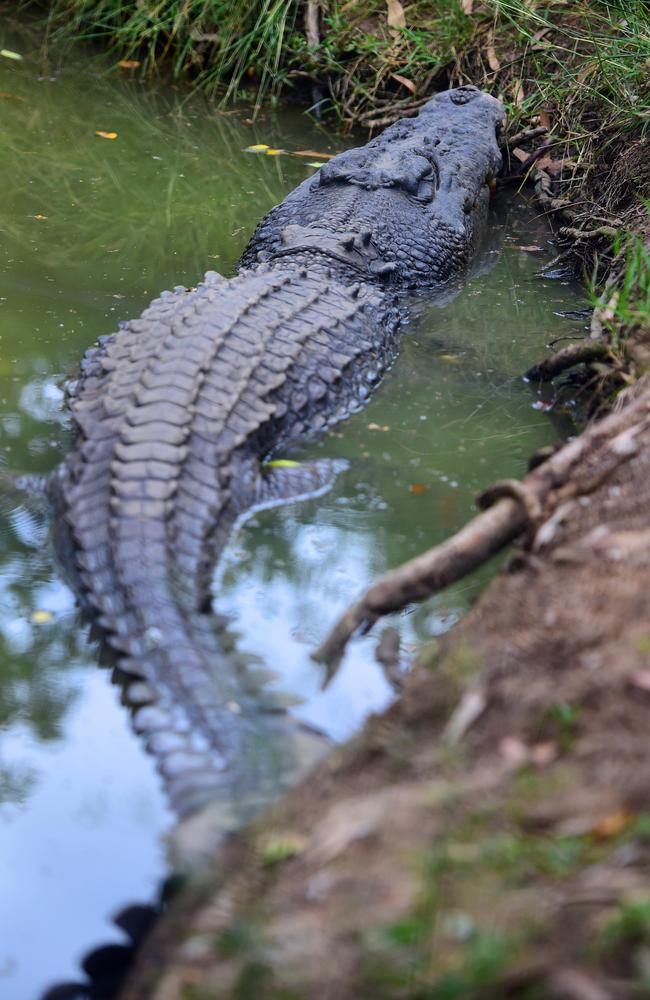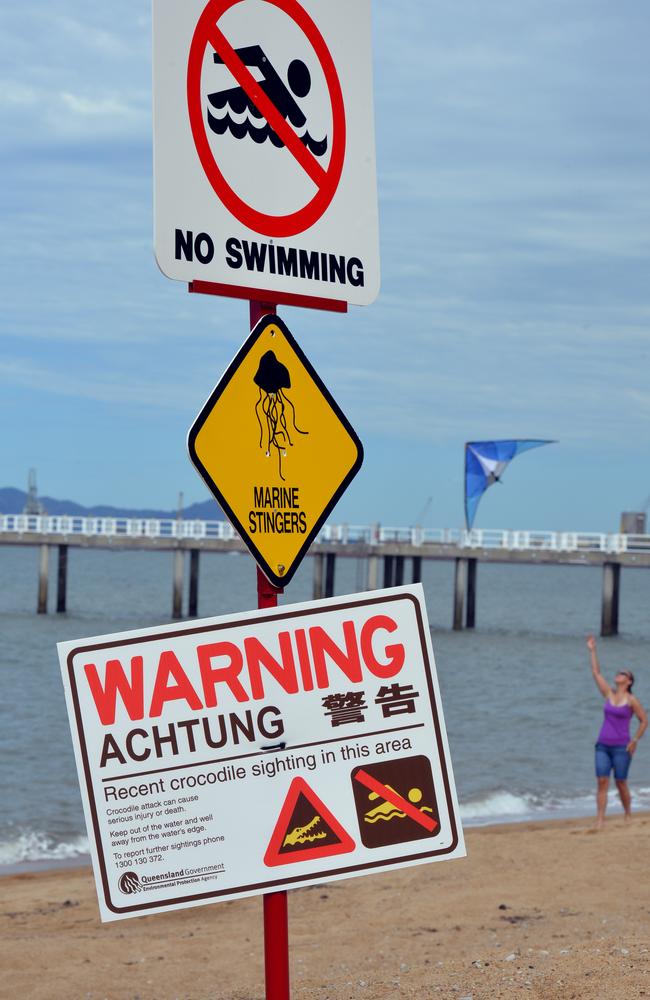Crocodiles and sharks may be one of the least deadly animals in Australia, but humans fear them the most
You might be more likely to end up in hospital after crossing paths with a dog, but it is crocodiles and sharks that strike fear in humans. Here’s why.
Townsville
Don't miss out on the headlines from Townsville. Followed categories will be added to My News.
A person in Australia is nearly 400 times more likely to bitten by a dog than be attacked by a crocodile – but it is the latter that strikes fear into the heart of everyone.
Humans are wired to fear predators such as sharks and crocodiles as a survival instinct and when someone is attacked by an apex predator it is national front page news.
This underlying fear drives the public need for detailed information on shark reports and croc sightings.
The Queensland Government has the Crocodile Sightings Dashboard where those living in ‘Croc Country’ can check for sightings in different local government areas from as far south as Rockhampton north to the Torres Strait Islands.
Over a period of 30 days in Townsville there were 20 reported croc sightings, second only to Cairns with 21. The Cassowary Coast recorded 20 sightings, with 18 crocodiles seen in the Hinchinbrook.
The Taronga Conservation Society Australia compiles the Australian Shark Incident Database with data stretching back to 1791.
Last year the shark database detailed 17 incidents across the country with four fatal, with most in WA with eight and one in Queensland.
The annual International Shark Attack File produced by the Florida Museum reported in February this year that Australia was a hot spot for shark attacks and accounted for 40 per cent of fatalities worldwide in 2023.
In July last year the Australian Institute of Health and Welfare released its report ‘Injury in Australia: Contact with Living Things’ causing 28,000 hospitalisations in the country with 27 deaths for the period 2021-2022.
The top cause of hospitalisations was non-venomous animals at 60 per cent and with dogs second at 56 per cent.
There were 9542 hospitalisations from contact with dogs compared to just 26 from contact with a crocodile or alligator in 2021-2022.

James Cook University Psychology Lecturer Christopher Reid said there were a combination of factors behind humans being wired to fear apex predators such as crocodiles and sharks.
“From an evolutionary perspective, we as a species, have evolved to fear potential threats to our survival and that’s obviously going to be inclusive of things like large predators,” the lecturer said.
“If we’re thinking back to the African Serengeti, you’re being able to identify a lion, and the threat imposed upon us in that situation was obviously adaptive to our survival.
“Looking back to those times that obviously enabled us to continue to reproduce and stick around.

“But what would occur in those situations was our fight or flight response being there to enable us ultimately, to be able to get out of that situation quickly.”
But the psychology lecturer said media and culture also played a big role in promoting the fear of predators as opposed to attacks by dogs.

“Media portrayals of attacks are quite often quite significant and I think, more of an unconscious level, we certainly don’t have a perception of fear with domesticated animals that we do with these predators we’re less familiar with.
“Things like media and culture will also influence the way we perceive the threat.
“The fear of unknown, you know, as a species, we have a tendency to like order, we don’t like chaos. And, you know, the, the idea of being in some of those environments we’re not quite so familiar with.

“But then also taking into account things like our cognitive biases, there’s something called the availability heuristic, which leads to us having a tendency to over-estimate the likelihood of events based on how easily we can recall a particular examples.
“For example, we may find it a lot easier to recall examples that we’ve heard of shark attacks, crocodile attacks, etc, and the significance of what injuries can be sustained in those situations or even death.
“Where dog attacks, you certainly hear about them in the media, you might see them in the movies from time to time, but they’re not as readily brought to mind as when someone gets attacked by a crocodile.”

Mr Reid said blockbuster movies such as the 1975 Jaws played on the audience’s fear of predators.
“That’s a really prime example, that movie of where there’s a little bit of sensationalism going on, is depicting sharks as relentless predators, which is going to leave a lasting impression with us and contribute to that fear of sharks that we have.
“You know, quite often these animals want to keep away from humans, they don’t have this inherent desire to target us as prey. But movies like that play it very differently.”
Mr Reid said these films also played into people’s desire to feel scared, but from the safe environment of a movie theatre.

“As a species we seem to have this desire to have a little bit of fear, because it gives us that general state of arousal.
“I think movies like that, can sustain that feeling.”
He said people like order and not chaos which was almost the fear of the unknown.
“There is something daunting about the prospect of sitting in the middle of the ocean, you can’t really see what’s below you.”
But when in ‘Croc Country’ or swimming in the ocean he said humans had an in-built desire to stay alive.
“We humans have a desire to stay alive and we have this in-built drive to be wary of unfamiliarity and to be wary of novelty.
“We would tend to, where we can perceive real danger to our safety if not life, we just have this in-built evolutionary response to steer clear, because we want to stay alive.”

Mr Reid said the flight or fight response would activate straightway when a person was confronted by a crocodile or shark.
“When you’re put into an actual situation that response, and also the stress response that we have, biologically, is obviously ramped up to the extreme.
“But we most certainly see an increase in physiological arousal, and that racing of thoughts in perceived danger as well.
“Our stress response sort of came about to keep us alive in the African Serengeti.
“It didn’t come about for us to worry about when we’re going to buy from Woolworths for dinner tonight, it didn’t come about for us to worry about how we’re going to pay the mortgage.
“But it is still that same system that enabled us to be wary of these large predators in order to ensure our survival.
“It’s very much inherent responsibly, we want to survive – we want to continue to reproduce.”
More Coverage
Originally published as Crocodiles and sharks may be one of the least deadly animals in Australia, but humans fear them the most




